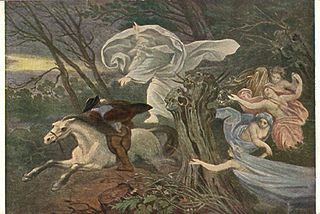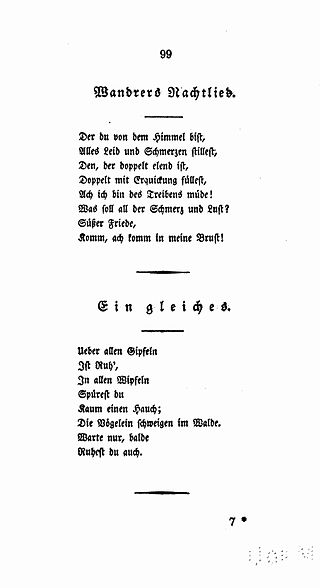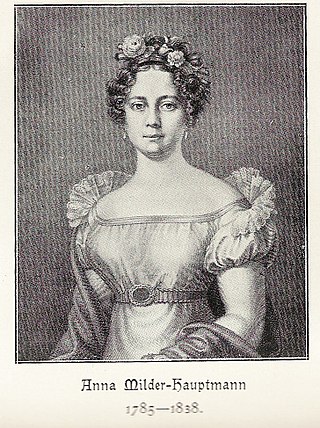
Johann Christoph Friedrich von Schiller was a German playwright, poet, philosopher and historian. Schiller is considered by most Germans to be Germany's most important classical playwright.
This is a list of music-related events in 1816.

The dithyramb was an ancient Greek hymn sung and danced in honor of Dionysus, the god of wine and fertility; the term was also used as an epithet of the god. Plato, in The Laws, while discussing various kinds of music mentions "the birth of Dionysos, called, I think, the dithyramb." Plato also remarks in the Republic that dithyrambs are the clearest example of poetry in which the poet is the only speaker.

"Erlkönig" is a poem by Johann Wolfgang von Goethe. It depicts the death of a child assailed by a supernatural being, the Erlking, a king of the fairies. It was originally written by Goethe as part of a 1782 Singspiel, Die Fischerin.

Conradin Kreutzer or Kreuzer was a German composer and conductor. His works include the operas Das Nachtlager in Granada and incidental music to Der Verschwender, both produced in 1834 in Vienna.

In European folklore and myth, the Erlking is a sinister elf who lingers in the woods. He stalks children who stay in the woods for too long, and kills them with a single touch.

Johann Rudolf Zumsteeg was a German composer and conductor from the Classical period.

"The Pledge" is a ballad published by the German poet Friedrich Schiller in his 1799 Musen-Almanach. He took the idea out of the ancient legend of Damon and Pythias issuing from the Latin Fabulae by Gaius Julius Hyginus, as rendered in the medieval collection of the Gesta Romanorum. It magnifies the belief in fidelity and loving friendship, and remains today one of the most famous German poems.

"Wanderer's Nightsong" is the title of two poems by the German poet Johann Wolfgang von Goethe. Written in 1776 and in 1780, they are among Goethe's most famous works. Both were first edited together in his 1815 Works Vol. I with the headings "Wandrers Nachtlied" and "Ein gleiches". The second poem was set by Schumann in his Lieder und Gesänge, Vol. IV, Op. 96. Both poems were set by Franz Schubert and catalogued as D 224 and D 768.

Theater am Kärntnertor or Kärntnertortheater was a prestigious theatre in Vienna during the eighteenth and nineteenth centuries. Its official title was Kaiserliches und Königliches Hoftheater zu Wien.
Karl Aage Rasmussen is a Danish composer and writer.

"Der König in Thule" is a German poem by Johann Wolfgang von Goethe, written in 1774.

"Der Handschuh" is a ballad by Friedrich Schiller, written in 1797, the year of his friendly ballad competition with Goethe. Other ballads written that year include Schiller's "Der Gang nach dem Eisenhammer", "Die Kraniche des Ibykus", "Der Ring des Polykrates", "Ritter Toggenburg", "Der Taucher", and Goethe's "Die Braut von Korinth", "Der Gott und die Bajadere", "Der Schatzgräber (Goethe)", "The Sorcerer's Apprentice".

Pauline Anna Milder-Hauptmann was an operatic soprano. Her career spanned a remarkable period in Western classical music: early on, she sang for Joseph Haydn; she later premiered some songs by Franz Schubert; and toward the end of career sang in the celebrated revival of J. S. Bach's Saint Matthew Passion under the direction of Felix Mendelssohn. Above all, Milder is remembered for having sung the demanding role of Leonore at the premieres of all three versions of Beethoven's opera Fidelio.
Cola Pesce, also known as Pesce Cola is an Italian folktale about a merman, mentioned in literature as early as the 12th century. Many variants and retellings have been recorded.

"Gesang der Geister über den Wassern" is a 1779 poem by Johann Wolfgang von Goethe (1749–1832). It may be best known in the English-speaking world through a musical setting of 1820–21 by Franz Schubert (1797–1828) as a part song for men's voices and low strings (D.714).

"Erlkönig", Op. 1, D 328, is a Lied composed by Franz Schubert in 1815, which sets Johann Wolfgang von Goethe's poem of the same name. The singer takes the role of four characters — the narrator, a father, his small son, and the titular "Erlking", a supernatural creature who pursues the boy — each of whom exhibit different tessitura, harmonic and rhythmic characteristics. A technically challenging piece for both performers and accompanists, "Erlkönig" has been popular and acclaimed since its premiere in 1821, and has been described as one of the "commanding compositions of the century".
Arnold Feil was a German musicologist and academic scholar.
Georg von Hofmann was an Austrian occasional poet.













